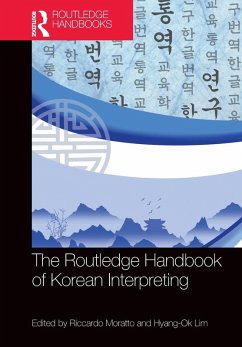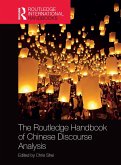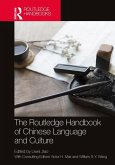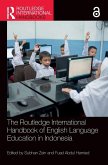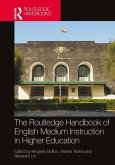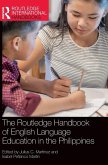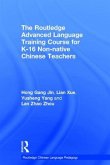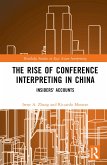The Routledge Handbook of Korean Interpreting
Herausgeber: Moratto, Riccardo; Lim, Hyang-Ok
The Routledge Handbook of Korean Interpreting
Herausgeber: Moratto, Riccardo; Lim, Hyang-Ok
- Broschiertes Buch
- Merkliste
- Auf die Merkliste
- Bewerten Bewerten
- Teilen
- Produkt teilen
- Produkterinnerung
- Produkterinnerung
Moratto and Lim bring together the most authoritative voices on Korean interpreting. An essential resource for researchers in Korean interpreting, that will also be very valuable more widely, particularly to those working with other East Asia languages.
Andere Kunden interessierten sich auch für
![The Routledge Handbook of Chinese Discourse Analysis The Routledge Handbook of Chinese Discourse Analysis]() Chris SheiThe Routledge Handbook of Chinese Discourse Analysis57,99 €
Chris SheiThe Routledge Handbook of Chinese Discourse Analysis57,99 €![The Routledge Handbook of Chinese Language and Culture The Routledge Handbook of Chinese Language and Culture]() The Routledge Handbook of Chinese Language and Culture266,99 €
The Routledge Handbook of Chinese Language and Culture266,99 €![The Routledge International Handbook of English Language Education in Indonesia The Routledge International Handbook of English Language Education in Indonesia]() The Routledge International Handbook of English Language Education in Indonesia287,99 €
The Routledge International Handbook of English Language Education in Indonesia287,99 €![The Routledge Handbook of English-Medium Instruction in Higher Education The Routledge Handbook of English-Medium Instruction in Higher Education]() The Routledge Handbook of English-Medium Instruction in Higher Education272,99 €
The Routledge Handbook of English-Medium Instruction in Higher Education272,99 €![The Routledge Handbook of English Language Education in the Philippines The Routledge Handbook of English Language Education in the Philippines]() The Routledge Handbook of English Language Education in the Philippines279,99 €
The Routledge Handbook of English Language Education in the Philippines279,99 €![The Routledge Advanced Language Training Course for K-16 Non-native Chinese Teachers The Routledge Advanced Language Training Course for K-16 Non-native Chinese Teachers]() Hong Gang JinThe Routledge Advanced Language Training Course for K-16 Non-native Chinese Teachers113,99 €
Hong Gang JinThe Routledge Advanced Language Training Course for K-16 Non-native Chinese Teachers113,99 €![The Rise of Conference Interpreting in China The Rise of Conference Interpreting in China]() The Rise of Conference Interpreting in China168,99 €
The Rise of Conference Interpreting in China168,99 €-
-
-
Moratto and Lim bring together the most authoritative voices on Korean interpreting. An essential resource for researchers in Korean interpreting, that will also be very valuable more widely, particularly to those working with other East Asia languages.
Produktdetails
- Produktdetails
- Verlag: Routledge
- Seitenzahl: 520
- Erscheinungstermin: 29. September 2025
- Englisch
- Abmessung: 244mm x 170mm x 28mm
- Gewicht: 887g
- ISBN-13: 9781032394343
- ISBN-10: 103239434X
- Artikelnr.: 75289345
- Herstellerkennzeichnung
- Libri GmbH
- Europaallee 1
- 36244 Bad Hersfeld
- gpsr@libri.de
- Verlag: Routledge
- Seitenzahl: 520
- Erscheinungstermin: 29. September 2025
- Englisch
- Abmessung: 244mm x 170mm x 28mm
- Gewicht: 887g
- ISBN-13: 9781032394343
- ISBN-10: 103239434X
- Artikelnr.: 75289345
- Herstellerkennzeichnung
- Libri GmbH
- Europaallee 1
- 36244 Bad Hersfeld
- gpsr@libri.de
Riccardo Moratto is Professor of Translation and Interpreting Studies at the Graduate Institute of Interpretation and Translation, Shanghai International Studies University, China; Chartered Linguist and Fellow Member of the Chartered Institute of Linguists (CIoL); Editor-in-Chief of the Interpreting Studies series for Shanghai Foreign Language Education Press (¿¿¿); General Editor of the Routledge Studies in East Asian Interpreting series; and General Editor of the Routledge Interdisciplinary and Transcultural Approaches to Chinese Literature series. Professor Moratto is a conference interpreter and renowned literary translator. He has published extensively in the field of translation and interpreting studies, Chinese translation and interpreting and Chinese literature. Hyang-Ok Lim is Professor at the Graduate School of Interpretation and Translation, Hankuk University of Foreign Studies, South Korea, since 1993 and is currently Dean of the same institution. She is a founding member of the Korean Society of Conference Interpretation, the first academic society for translation studies in Korea, which publishes FORUM, an international translation studies journal. She is also on the editorial board of InContext: Studies in Translation and Interculturalism. She has written numerous articles and books regarding interpretation.
Introduction. A HISTORICAL PERSPECTIVE 1. From Whence Do We Come? A
Panoramic View of Interpretation in Korea with a Focus on Educational
Institutions 2. A Study on the Activities of Interpreters and Translators
in Politics, Diplomacy, and Society of the Goryeo and Joseon Dynasties 3.
History of Interpreting in the Joseon Dynasty: Six Selected Interpreting
Officials 4. In Search of Interpreters on the Demarcation Line 5.
Interpreters Portrayed in Korean News Media (1948-2022) 6. Theoretical
Constituents of Interpreting Research in Korea: A Meta-Analysis of Research
Publications from 1998-2022 EDUCATION 7. What's Next? The Status Quo and
Challenges of Undergraduate Interpretation and Translation Education in
Korea 8. Redesigning the Learning Experience for the Consecutive
Interpreting Classroom 9. Flipped Learning in the Undergraduate
Interpretation and Translation Classroom 10. The Use of Interpreting
Textbooks: A Survey Study 11. An Analysis of Conference Interpreting
Practices for Effective Pedagogy: Considerations for Simultaneous
Interpretation between Korean and French 12. The Present and Future of
Korean MTI Education in China: A Case of Guangdong University of Foreign
Studies 13. Let them Talk: Rethinking Learners' Roles in Interpreting
Performance Assessment 14. A Case Study on Student Interpreters'
Self-assessment in Interpreting Training 15. A Systemic Functional
Linguistic Analysis of the Consecutive Interpretation of Bong's Oscar Award
speech COMMUNITY INTERPRETING 16. Healthcare Interpreting for Korean
Immigrants in Australia: Linguistic and Cultural Perspectives 17.
Australian Healthcare Interpreters' Perceptions of the Challenges in
Intercultural Communication 18. Analyzing the Motivations for Self-repairs
among Russian Police Interpreters in South Korea 19. A Study on the Status
of Interpretation for Arab Refugees in South Korea and Interpretation
Improvement 20. On Training Sermon Interpreters: With Reference to
Interviews with Sermon Interpreters and Surveys on User-expectations 21.
Unwritten Rules and Indispensable Tools: Cultural Aspects of Korean
Interpreting 22. Korean Court Interpreting in the U.S.: History, Obstacles
and Advanced Techniques 23. A Study of Interpreters' Speech Acts Based on a
Corpus of Chinese-Korean Diplomatic Interpreting OPPORTUNITIES FOR THE
FUTURE 24. Research on Interpreters' and Translators' Cognition in Korea
25. Exploring the Possibility of Using Speech-to-Text Transcription as a
Tool for Interpretation 26. Market Demand for Professional Interpreting
Services in South Korea 27 A Study of Technological Competence for Remote
Interpreting and Current Status of Competence among Korea's Interpreters
28. Remote Interpreting during COVID-19: A Case Study of an In-house
Interpreter in Korea 29. Evaluation of Korean Chinese Automatic
Interpretation Quality
Panoramic View of Interpretation in Korea with a Focus on Educational
Institutions 2. A Study on the Activities of Interpreters and Translators
in Politics, Diplomacy, and Society of the Goryeo and Joseon Dynasties 3.
History of Interpreting in the Joseon Dynasty: Six Selected Interpreting
Officials 4. In Search of Interpreters on the Demarcation Line 5.
Interpreters Portrayed in Korean News Media (1948-2022) 6. Theoretical
Constituents of Interpreting Research in Korea: A Meta-Analysis of Research
Publications from 1998-2022 EDUCATION 7. What's Next? The Status Quo and
Challenges of Undergraduate Interpretation and Translation Education in
Korea 8. Redesigning the Learning Experience for the Consecutive
Interpreting Classroom 9. Flipped Learning in the Undergraduate
Interpretation and Translation Classroom 10. The Use of Interpreting
Textbooks: A Survey Study 11. An Analysis of Conference Interpreting
Practices for Effective Pedagogy: Considerations for Simultaneous
Interpretation between Korean and French 12. The Present and Future of
Korean MTI Education in China: A Case of Guangdong University of Foreign
Studies 13. Let them Talk: Rethinking Learners' Roles in Interpreting
Performance Assessment 14. A Case Study on Student Interpreters'
Self-assessment in Interpreting Training 15. A Systemic Functional
Linguistic Analysis of the Consecutive Interpretation of Bong's Oscar Award
speech COMMUNITY INTERPRETING 16. Healthcare Interpreting for Korean
Immigrants in Australia: Linguistic and Cultural Perspectives 17.
Australian Healthcare Interpreters' Perceptions of the Challenges in
Intercultural Communication 18. Analyzing the Motivations for Self-repairs
among Russian Police Interpreters in South Korea 19. A Study on the Status
of Interpretation for Arab Refugees in South Korea and Interpretation
Improvement 20. On Training Sermon Interpreters: With Reference to
Interviews with Sermon Interpreters and Surveys on User-expectations 21.
Unwritten Rules and Indispensable Tools: Cultural Aspects of Korean
Interpreting 22. Korean Court Interpreting in the U.S.: History, Obstacles
and Advanced Techniques 23. A Study of Interpreters' Speech Acts Based on a
Corpus of Chinese-Korean Diplomatic Interpreting OPPORTUNITIES FOR THE
FUTURE 24. Research on Interpreters' and Translators' Cognition in Korea
25. Exploring the Possibility of Using Speech-to-Text Transcription as a
Tool for Interpretation 26. Market Demand for Professional Interpreting
Services in South Korea 27 A Study of Technological Competence for Remote
Interpreting and Current Status of Competence among Korea's Interpreters
28. Remote Interpreting during COVID-19: A Case Study of an In-house
Interpreter in Korea 29. Evaluation of Korean Chinese Automatic
Interpretation Quality
Introduction. A HISTORICAL PERSPECTIVE 1. From Whence Do We Come? A
Panoramic View of Interpretation in Korea with a Focus on Educational
Institutions 2. A Study on the Activities of Interpreters and Translators
in Politics, Diplomacy, and Society of the Goryeo and Joseon Dynasties 3.
History of Interpreting in the Joseon Dynasty: Six Selected Interpreting
Officials 4. In Search of Interpreters on the Demarcation Line 5.
Interpreters Portrayed in Korean News Media (1948-2022) 6. Theoretical
Constituents of Interpreting Research in Korea: A Meta-Analysis of Research
Publications from 1998-2022 EDUCATION 7. What's Next? The Status Quo and
Challenges of Undergraduate Interpretation and Translation Education in
Korea 8. Redesigning the Learning Experience for the Consecutive
Interpreting Classroom 9. Flipped Learning in the Undergraduate
Interpretation and Translation Classroom 10. The Use of Interpreting
Textbooks: A Survey Study 11. An Analysis of Conference Interpreting
Practices for Effective Pedagogy: Considerations for Simultaneous
Interpretation between Korean and French 12. The Present and Future of
Korean MTI Education in China: A Case of Guangdong University of Foreign
Studies 13. Let them Talk: Rethinking Learners' Roles in Interpreting
Performance Assessment 14. A Case Study on Student Interpreters'
Self-assessment in Interpreting Training 15. A Systemic Functional
Linguistic Analysis of the Consecutive Interpretation of Bong's Oscar Award
speech COMMUNITY INTERPRETING 16. Healthcare Interpreting for Korean
Immigrants in Australia: Linguistic and Cultural Perspectives 17.
Australian Healthcare Interpreters' Perceptions of the Challenges in
Intercultural Communication 18. Analyzing the Motivations for Self-repairs
among Russian Police Interpreters in South Korea 19. A Study on the Status
of Interpretation for Arab Refugees in South Korea and Interpretation
Improvement 20. On Training Sermon Interpreters: With Reference to
Interviews with Sermon Interpreters and Surveys on User-expectations 21.
Unwritten Rules and Indispensable Tools: Cultural Aspects of Korean
Interpreting 22. Korean Court Interpreting in the U.S.: History, Obstacles
and Advanced Techniques 23. A Study of Interpreters' Speech Acts Based on a
Corpus of Chinese-Korean Diplomatic Interpreting OPPORTUNITIES FOR THE
FUTURE 24. Research on Interpreters' and Translators' Cognition in Korea
25. Exploring the Possibility of Using Speech-to-Text Transcription as a
Tool for Interpretation 26. Market Demand for Professional Interpreting
Services in South Korea 27 A Study of Technological Competence for Remote
Interpreting and Current Status of Competence among Korea's Interpreters
28. Remote Interpreting during COVID-19: A Case Study of an In-house
Interpreter in Korea 29. Evaluation of Korean Chinese Automatic
Interpretation Quality
Panoramic View of Interpretation in Korea with a Focus on Educational
Institutions 2. A Study on the Activities of Interpreters and Translators
in Politics, Diplomacy, and Society of the Goryeo and Joseon Dynasties 3.
History of Interpreting in the Joseon Dynasty: Six Selected Interpreting
Officials 4. In Search of Interpreters on the Demarcation Line 5.
Interpreters Portrayed in Korean News Media (1948-2022) 6. Theoretical
Constituents of Interpreting Research in Korea: A Meta-Analysis of Research
Publications from 1998-2022 EDUCATION 7. What's Next? The Status Quo and
Challenges of Undergraduate Interpretation and Translation Education in
Korea 8. Redesigning the Learning Experience for the Consecutive
Interpreting Classroom 9. Flipped Learning in the Undergraduate
Interpretation and Translation Classroom 10. The Use of Interpreting
Textbooks: A Survey Study 11. An Analysis of Conference Interpreting
Practices for Effective Pedagogy: Considerations for Simultaneous
Interpretation between Korean and French 12. The Present and Future of
Korean MTI Education in China: A Case of Guangdong University of Foreign
Studies 13. Let them Talk: Rethinking Learners' Roles in Interpreting
Performance Assessment 14. A Case Study on Student Interpreters'
Self-assessment in Interpreting Training 15. A Systemic Functional
Linguistic Analysis of the Consecutive Interpretation of Bong's Oscar Award
speech COMMUNITY INTERPRETING 16. Healthcare Interpreting for Korean
Immigrants in Australia: Linguistic and Cultural Perspectives 17.
Australian Healthcare Interpreters' Perceptions of the Challenges in
Intercultural Communication 18. Analyzing the Motivations for Self-repairs
among Russian Police Interpreters in South Korea 19. A Study on the Status
of Interpretation for Arab Refugees in South Korea and Interpretation
Improvement 20. On Training Sermon Interpreters: With Reference to
Interviews with Sermon Interpreters and Surveys on User-expectations 21.
Unwritten Rules and Indispensable Tools: Cultural Aspects of Korean
Interpreting 22. Korean Court Interpreting in the U.S.: History, Obstacles
and Advanced Techniques 23. A Study of Interpreters' Speech Acts Based on a
Corpus of Chinese-Korean Diplomatic Interpreting OPPORTUNITIES FOR THE
FUTURE 24. Research on Interpreters' and Translators' Cognition in Korea
25. Exploring the Possibility of Using Speech-to-Text Transcription as a
Tool for Interpretation 26. Market Demand for Professional Interpreting
Services in South Korea 27 A Study of Technological Competence for Remote
Interpreting and Current Status of Competence among Korea's Interpreters
28. Remote Interpreting during COVID-19: A Case Study of an In-house
Interpreter in Korea 29. Evaluation of Korean Chinese Automatic
Interpretation Quality

